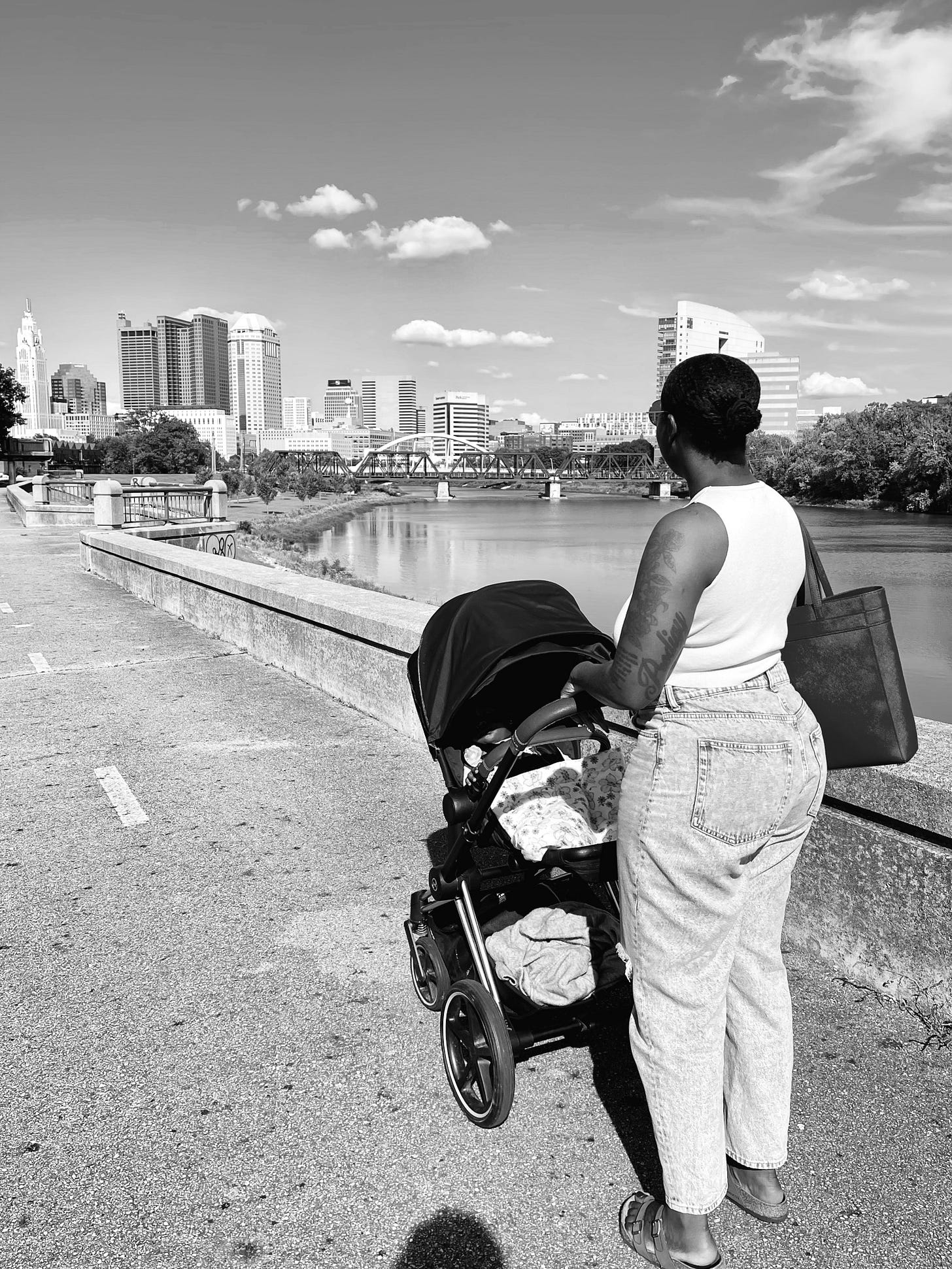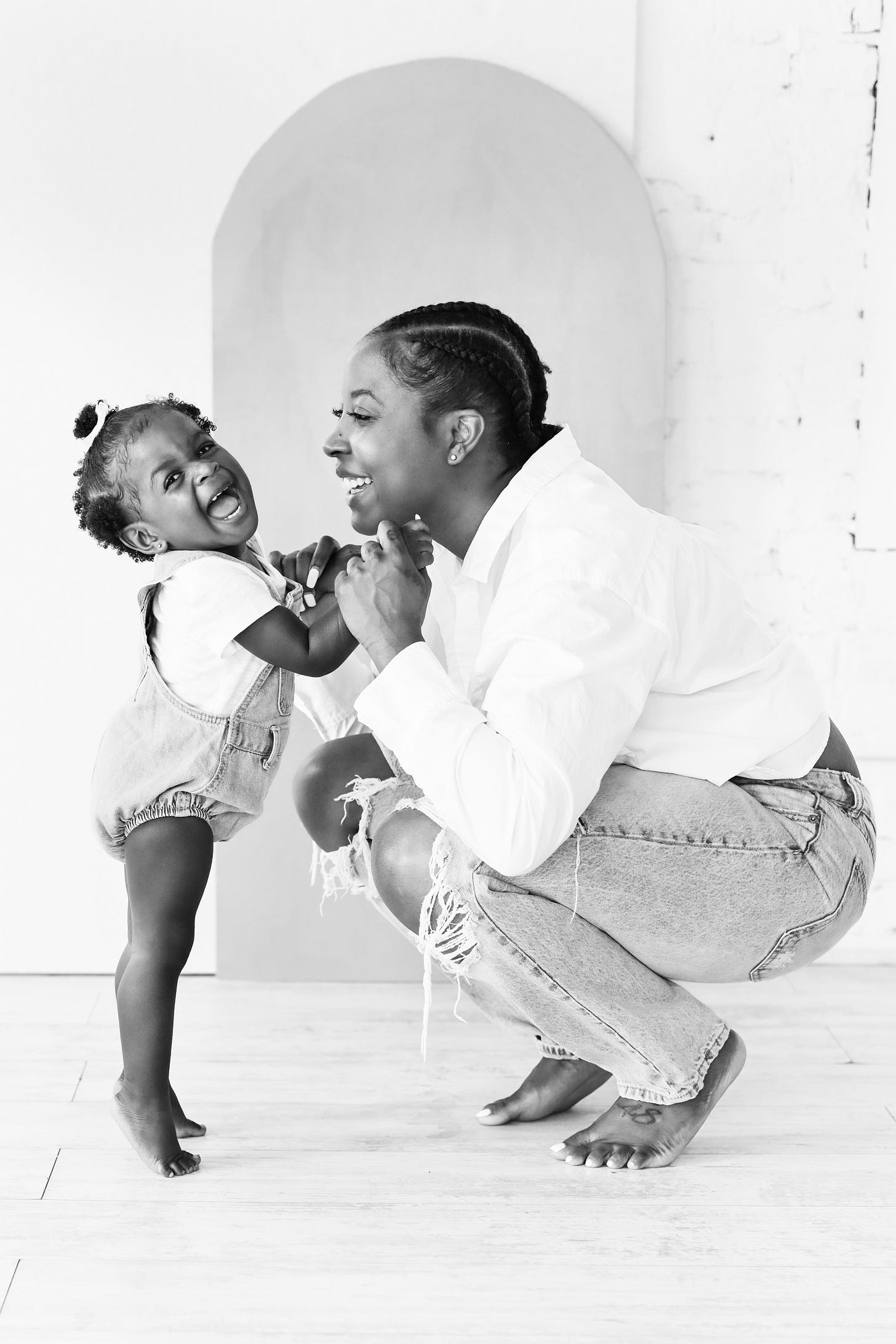Notes from a Babymama
I grieve that I did not give her a safe parent. Safe in the emotional, sacred ways. And yet—I am grateful she has known battle.
Hearing my ex call me his babymama in court unnerved me. Especially while I sat next to my loving, protective partner, who likes to remind me at random that he knew what he was signing up for when he decided to be with me, and that this isn’t going to run him off.
Not just the word—babymama—but the his. The possessive. The quiet violence of “mine.”
As I loomed over what it means—to him, to me—to be called this, I wondered if it was a term of endearment, a curse, or some sick way of still laying claim. The my before babymama. The my before ex. And I suppose I do this too, in my own way. Because a child binds us. But it doesn’t hold us prisoner.
And I know this—because my father was in prison my entire childhood. And he and my mother never spoke or wrote love letters. Not for long. My mother isn’t a writer. But more than that—she isn’t patient.
My daughter’s biological father is not in prison, but he holds a fantasy prisoner in his mind. One of family. One he lost. One the courts will say, is legally, still his. My fight in family court is ever-present. Always in the room. Always on my breath.
I am not friends with my daughter’s biological father. Simply because I can’t be. Because his love language was control. Abuse was his tool to get it.
And when my daughter was two months old, I made the decision: I wasn’t going to be friends—nor pretend to be—with an abuser.
I have always stored hope in my heart. But the lack of protection in the early stages of my motherhood destroyed a great deal of that hope. It turned me feral. It made me afraid. And there is no love where fear is the foundation. Not the real kind.
Not the kind I want to show my children.
It took five years in litigation, three out-of-pocket mediations, and every ounce of my energy to finally realize he didn’t want healing. He didn’t want peace. He wanted me to suffer because I left him—in the winter, the only day it snowed in Houston in years. And that wound is open, and he has made it clear: it will never close.
And what is a father doing, if not teaching his daughter protection from the very day she is born? This is apparent.
But not for little girls like me. Or like my daughter. Our fathers taught us perseverance before we even knew what protection meant.
My daughter is a playful little lion, with still eyes. She knows the art of being silent. How to make people wait. How to make someone bend. At two months old, she started mimicking my independence. She could hold her bottle at three months. She was walking at eight. Her first words after “mama” were “no” and then “go.”
I have wanted nothing more in this life but to show my daughter what a two-parent household looks like. What love between a father and mother sounds like. But more than that, I want her to see my ability to be friends—best friends—with the man I am raising children with.
My mother once told me: the best thing a woman can be to a man is his friend. And often, when my partner and I—both romantics, both givers, both artists, both extreme in our love—are arguing and fear takes hold of us, it is our friendship that saves us from being swallowed by the lies. It is our friendship that saves our relationship.
I’ll have to spend a great deal of time teaching my daughter how to tame her prowess.
I’ve already taught her how to paint.
How to stick jewels to her nail bed.
How to moisturize her skin with coconut milk.
How to plant seeds in her garden box—where my partner secured her pop-up butterflies and plant tags.
She waters the plants. And all of us, with her laughs, with her songs.
And yet I cannot confirm her softness is embedded. I can’t say she knows how to feel safe.
Maybe it’s mother’s intuition. Or maybe it’s every night, when I put her to bed, the small act of her grabbing hold of my ear—a gesture she’s done since birth—that tells me she’s not too far from my womb. Maybe she’s still aching to get back there.
I am torn between grief and gratitude.
I grieve that I could not give her the luxury of a safe parent. Safe in the emotional, sacred ways.
And yet—I am grateful she has known battle. Grateful she has seen war. Because now, she is armed with the very arsenal life was going to hand her anyway.
She has unshakable stealth.
I’m learning—painfully, honestly—that I cannot protect her from her path. Not from the courts. Not from family dysfunction. Not from child protective investigations. Not from him.
I can only steward. I can only tarry. The way I did when she was still a little coconut in my arms.
Motherhood is not sainthood. It is not performance. It is not sacrifice for the sake of being sanctified.
It is staying. It is trying. It is growing—even in the dark.






And this: “I’m learning—painfully, honestly—that I cannot protect her from her path.” Truth. Truth that’s hard to acknowledge. And wisdom. Wisdom I think I needed just now.
My daughter is much older, an adult in her own right for a decade. But I’m still her mother. And I’m still trying to protect her from her path.
Knowing the difference between this and stewarding is my current parenting battle, as she’s going through something. And I want so badly to steer her along another path.
Thank you for this beautiful post. And my best wishes to you. What a wonderful mantra. May it serve you well.
"My daughter is a playful little lion, with still eyes." What a gorgeous description of her.